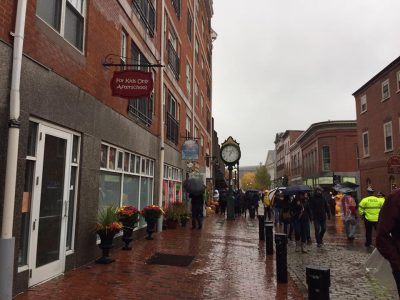Businesses in Salem are preparing for reduced crowd sizes and revenues this October as the ongoing pandemic interferes with the city’s usually busy Halloween season.

Though most public events have been canceled, interest in visiting Salem has remained high, according to Kate Fox, executive director of Destination Salem. In a typical year, street fairs and other festivities drive Salem’s October traffic, which accounts for roughly 30 percent of the city’s annual tourism revenue.
“Salem always sees a crescendo of tourism that comes through the summer into October, and that’s been the case this year as well, so it has been busy,” Fox said. “People are still coming just because they want to be in Salem, and they want to experience fall in New England,”
Fox added that visitors will need to be more proactive when planning their trips than in the past because of strict capacity rules for restaurants and attractions.
Dick Pabich, owner of the Salem Inn, said despite closures at the onset of the pandemic, the hotel has seen near-normal booking rates since reopening in July. He added that a majority of current guests are coming from out of state.
“People are coming to Salem because it’s Salem,” Pabich said. “October has always been progressively getting busier and busier and busier. And our repeat guests are happier and happier and happier.”
Since March, Pabich said the Inn has implemented measures such as contactless check-in to reduce the risk of transmission between guests and employees. In addition, guests who refuse to comply with the City’s mask mandate are turned away at arrival.
“We’ll give them their money back if they go home,” Pabich said. “If you don’t want to wear a mask, we don’t want you in here.”
Fox said this year’s tourism advertising has focused on informing visitors of cancellations and health protocols.
Despite the new campaign, many are arriving in Salem with mismatched expectations.
Tina Jordan, director of the Salem Witch Museum, said some visitors have been unaware of the museum’s elimination of physical tickets or noncompliant with the state’s mask mandate.
She added that many attempts to explain the situation to guests have been unsuccessful.
“What I’ve found is the more you tell people, ‘Don’t come,’” Jordan said, “the more they want to be here.”
The museum, which usually sees a spike in attendance around Halloween, is currently operating at 40 percent capacity, meaning that revenues are down even when presentations sell out, Jordan said.
Jordan added that sanitation and staffing costs have increased as revenues have declined.
“If people think that because of [COVID-19], you don’t need as many staff, you’re 100 percent wrong,” Jordan said. “We need more people giving people instructions, making sure people are physically distancing and making sure that we can clean and keep everyone safe.”
Many of the museum’s staff members over 65 years old have chosen not to work due to concerns about personal safety, Jordan said.
The historic House of Seven Gables, which typically accommodates as many as 200 visitors per hour, has reduced its capacity to 50 people outside, Community Engagement Director Julie Arrison-Bishop said.
Visitors are restricted to the grounds and garden, which Arrison-Bishop said helps the museum’s budget but limits attendee involvement. In response, the museum has improved digital tours to supplement guests’ experiences.
“They’re not seeing the furnishings, they’re not seeing the way that people lived over 350 years,” Arrison-Bishop said. “But they’re still getting that history and that information.”
These declines in attendance have translated into severe losses of revenue, Arrison-Bishop said — around 90 percent of its typical income was lost this year.
After running out of Paycheck Protection Program funding, the historic site laid off around 20 staff members, she said. Along with a few grants, revenue from October crowds will fund utilities and preservation work.
Arrison-Bishop added that the past two weekends have been busier than the rest of the year, giving hope for October.
To supplement reduced admissions revenues, a number of businesses, including the House of Seven Gables and the Peabody Essex Museum, are now offering ticketed virtual programming.
Fox said that while these online events will likely help maintain outside engagement and may boost future visits to the city, they will be unable to aid Salem’s economy in the same way in-person programming would.
“If you’re doing a virtual book club from Indiana,” Fox said, “you’re not going to be helping our meals and hotel tax revenue.”
She added that many residents are worried about the health impacts of an influx of tourists.
Salem currently has a 90-percent compliance rate with mask wearing, Fox said, adding that workers remind visitors of the law.
Still, many shops and restaurants are hopeful that October will fill the gap of lost summer revenues, according to Fox.
“I’m cautiously optimistic we’ll have a great October that’s going to look very different than Haunted Happenings has in the past,” Fox said. “I really want visitors who are coming in this year to have their expectations set accordingly.”































































































































Debra Allerhand • Oct 2, 2020 at 12:39 pm
Wonderfully written article !